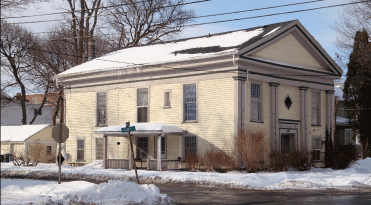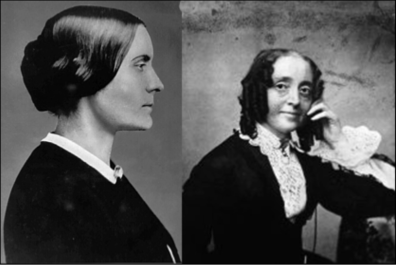Penn Yan's Women's Rights Convention 1855
Yates Past - May 2009
 I have often driven past the building in this photo and wondered about it. The building is on the corner of Main St. and Court St. in Penn Yan just across from the Yates County Courthouse park. It is an apartment building today, based on the number of electric meters on the outside. It was a private residence for many years before that, but the architecture isn’t that of a private home. It was built to be a church in the early 1850s. The Methodist congregation in Penn Yan split over the issue of slavery. Not that there was a pro-slavery faction. in the church. The issue was how far one should go in opposing slavery. Should a person violate federal law by harboring runaway slaves in their homes? The more radical faction believed that a “higher law” needed to be obeyed by supporting the Underground Railroad. That faction built the building shown in the photo as the Wesleyan Methodist Church. The split in the Methodist congregation lasted until 1864 when the Wesleyan congregation disbanded and the building was sold. It was a private residence well into the twentieth century. I have often driven past the building in this photo and wondered about it. The building is on the corner of Main St. and Court St. in Penn Yan just across from the Yates County Courthouse park. It is an apartment building today, based on the number of electric meters on the outside. It was a private residence for many years before that, but the architecture isn’t that of a private home. It was built to be a church in the early 1850s. The Methodist congregation in Penn Yan split over the issue of slavery. Not that there was a pro-slavery faction. in the church. The issue was how far one should go in opposing slavery. Should a person violate federal law by harboring runaway slaves in their homes? The more radical faction believed that a “higher law” needed to be obeyed by supporting the Underground Railroad. That faction built the building shown in the photo as the Wesleyan Methodist Church. The split in the Methodist congregation lasted until 1864 when the Wesleyan congregation disbanded and the building was sold. It was a private residence well into the twentieth century.
In the time a Wesleyan Church existed in that building, a significant women’s rights convention was held there. The convention convened on January 10, 1855, just seven years after the first convention was held in Seneca Falls. The local organizers of the event were Mrs. Abner (Alida) Bridgman and Mrs. Stafford C. (Obedience ... an ironic name for a feminist leader) Cleveland of Penn Yan. According to articles in the Yates County Whig, “A very large and respectable assemblage of men and women were present, a great proportion of whom were from the surrounding towns.”

Susan B. Anthony and Ernestine L. Rose |
One of the two main speakers at the convention was Susan B. Anthony of Rochester. Miss Anthony, 35 years old at the time, had been active in the anti-slavery and temperance movements. She was introduced to Elizabeth Cady Stanton on the streets of Seneca Falls in 1851, and quickly became active in the women’s rights movement. She addressed the convention in the afternoon session. She started her program by asking that a resolution be passed which claimed the right to vote for women, basing her argument on “taxation without representation is tyranny.” The resolution was unanimously adopted. In the main part of her program, Miss Anthony touched upon the issues of educational and employment opportunities for women. She told those in attendance, “Woman is the greatest enemy of her own sex! She spurns the betrayed but feels flattered by the attentions of the betrayer!” She closed her part of the program by asking for names on petitions to be sent to the New York Legislature demanding the “Elective Franchise.” The Yates County Whig reported: “Miss Susan B. Anthony of Rochester addressed the Convention in a speech of considerable length, and much ability and power. She is an excellent speaker and capable of interesting her hearers to an absorbing degree. She was particularly forcible on the remarkable inequality existing between men and women as to the rights of property and the privileges of honorable employment.”
The main speaker at the evening session was Ernestine L. Rose of New York City. Considering where American society was in the decade before the Civil War, Mrs. Rose was on the surface quite “out of synch”. She was a Polish immigrant, born Jewish, and an avowed atheist. Despite all that, she was elected President of the National Women’s Rights Convention in 1854 by men and women who were overwhelmingly Protestant and motivated by religious principles. She was called the “Queen of the Platform” and was considered by some to be the best female orator of her time. At the time of her appearance in Penn Yan she was 45 years old and had been in the United States for nearly twenty years. Her speech that evening lasted two and a half hours. According to Alida Bridgman who wrote a summary for the local newspaper, “Mrs. Rose’s language is simple, plain, and to the point; and the beauty of her diction is perhaps enhanced by her foreign accent. Her power of enchanting an audience is truly wonderful.” In her speech she said “Women’s Rights are human rights! It is deemed a final answer to all claim for Women’s Rights that St. Paul told the women to submit themselves to their husbands. To this it may be replied that had our forefathers consulted the same authority, our liberties would not have been established, for the taxes and adherence to the British crown had all the advantage of Scriptural authority. Are we not told to render unto Caesar that which is Caesar’s and that the powers that be are ordained by God? Had our revolutionary patriots adhered to that authority, Boston Harbor would never have been converted into a magnificent teapot and our liberties would not have been established. Let women follow their example!”
The next time you are driving on Main Street in Penn Yan and are near the Courthouse park, look at that building for a minute and think about the fiery oratory that echoed off its walls in the name of human rights 154 years ago. Also, do an internet search on Ernestine L. Rose. She lived a fascinating life and was a tough, inspirational leader. She was as active in the abolitionist movement as she was in women’s rights. Her atheism, her fiery oratory, and her radical stands incurred the wrath of many. Once when she spoke in Maine, a newspaper editor wrote “It would be shameful to listen to this woman, a thousand times below a prostitute.” In South Carolina, a minister forbade his congregation to listen to “this female devil”.
“All I can tell you is that I used my humble powers to the uttermost, and raised my voice in behalf of Human Rights in general, and the elevation and Rights of Women in particular, nearly all my life. Yet in spite of hardships, for it was not easy to travel at that time as now; and the expense, as I never made a charge or took up a collection. I look back to that time, when a stranger and alone, I went from place to place, in highways and byways, did the work and paid my bills with great pleasure and satisfaction; for the Cause gained ground and in spite of the heresies, I had always good audiences, attentive listeners, and was well received wherever I went.”
- Ernestine L. Rose, letter to Susan B. Anthony, January 9, 1877
by Rich MacAlpine
|
